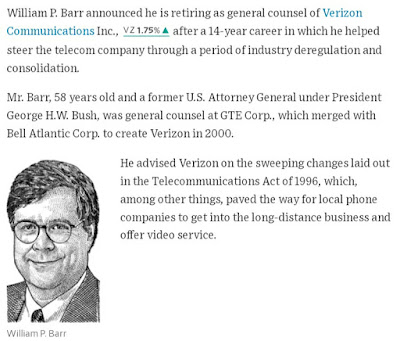Whilst trying to make sense of this Bureau of Industry and Security, George W Bush set up in 2001 whose "principal role is to help stop proliferation of weapons of mass destruction" (things like secure communications technology, for example) I came across an interesting bit of US Attorney General William Barr's history.
This is from a Wall Street Journal piece in 2008 "Verizon's Barr Plans to Retire":
See New York Times Verizon Common Stock Holders.
And here is a piece with some interesting history of MCI's fortunes. MCI's entry into the long-distance telephony market was one of the reasons for the AT&T anti-trust lawsuit that broke up the monopoly in 1980. In 1998, William Barr was general Counsel for GTE, when MCI was valued at US$47 billion. But by 2004 it was bankrupt, facing SEC fines and under investigation for massive fraud and Verizon got it for $6 billion.
This is from a Wall Street Journal piece in 2008 "Verizon's Barr Plans to Retire":
See New York Times Verizon Common Stock Holders.
And here is a piece with some interesting history of MCI's fortunes. MCI's entry into the long-distance telephony market was one of the reasons for the AT&T anti-trust lawsuit that broke up the monopoly in 1980. In 1998, William Barr was general Counsel for GTE, when MCI was valued at US$47 billion. But by 2004 it was bankrupt, facing SEC fines and under investigation for massive fraud and Verizon got it for $6 billion.
In 1996, British Telecom offered to buy MCI for $24 billion, hoping to create a global company that would be known as Concert Plc. The talks broke down a year later, but by then MCI was in play. GTE, now part of Verizon, made a run, followed by WorldCom, which acquired MCI for $47 billion in 1998. ...
... Given the sorry state it was in two years ago — mired in the biggest bankruptcy in history, facing $750 million in fines from the Securities and Exchange Commission, and trying to unravel $11 billion in fraudulent accounting — MCI's sale is nothing short of spectacular.


No comments:
Post a Comment